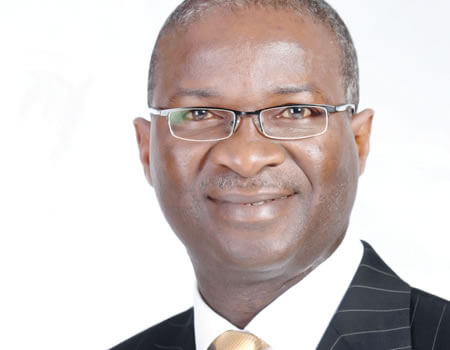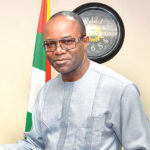
Not been unmindful of the expectations of Nigerians as far as infrastructure provisions is concerned, and giving the enormous responsibility he carries, Minister of Power, Works and Housing, Mr. Babatunde Fashola, last week, reemphasised the commitment of the present administration to the provision of sustainable infrastructure and other amenities.
The Minister, who reeled out the achievements of President Muhammadu Buhari’s administration in the areas of power, works and housing in the last three and half years, said the projects executed by his ministry are of high qualities capable of standing the test of time.
ALSO READ: Dogara condemns assassination attempt on Ekweremadu
In the beginning
Going back the memory lane, Fashola noted that in 2015 when the current administration came into office, the budget left behind for the three ministries, by the previous government was N19 billion for works, N5 Billionfor power, and N1.2 Billionfor housing making a total of N25.2 Billion.
In the year 2017, the budget for works was N394 Billion; Power was N69.96 Billionand Housing was N64.9 Billion (Total N529 Billion).
“However, in a country where the population is growing faster than the infrastructure, the difference between these budgets must tell you that this government is more serious about providing infrastructure to support the people.
“So, if you need more roads, more bridges, more power, more housing and Job opportunities and prosperity that their delivery will bring, your choice in the next election should be easier’,said Fashola, urging Nigerians not to go back to a budget of N25.2 Billion for Infrastructure, but to move forward with a budget for Infrastructure which has grown to N543 Billion in 2018.
To justify his position that the administration is on right footing, the minister compared the difference between these two budget sizes, saying that the last government was spending less on infrastructure for almost one decade when oil prices stayed at $100 per barrel while his government is spending more on infrastructure when oil prices largely hovered between $40-$60.
He also emphasised the fact that over the last 10 years, from the proceeds of oil, Saudi Arabia spent $420 billion on infrastructure. But quickly to add that the issue is not about spending money alone, but rather, about what were done with it; and what was left behind for the current government.
“What was left behind were massive debts owed to contractors who had not been paid for 3 to 5 years and who had laid off thousands of workers and shut down equipment and plants, which was the reasons the economy first went into recession.
Besides, the minister bemoaned a huge debts owed state government’s, that was inherited by this administration. “State governments who were forced to intervene on federal infrastructure especially roads and bridges. That figure stands at about N450 Billion!.
He stated that they were preoccupied with the payment of contractors and that as at today, there is no state in Nigeria where government is not building, at least, one Federal road.
Housing
The minister, while emphasising the commitment of government to housing projects, noted that: “ More than anything, we are constructing houses in 34 states in a pilot scheme to determine affordability and acceptability; and we have 90 transmission projects aimed at improving connectivity between the GenCos and the DisCos to increase the power sector.
“On the housing side, as I stated, we are in every state including all the states of the South West except Lagos. Each site employs not less than 1,000 people made up of builders, artisans, fabricators, and vendors of various items with the plan to do much more”, he said.
The minister also hinted that close to 90 projects that were in moribund state were resuscitated.
“ Close to 90 projects are largely resuscitated because this government has recovered 690 containers of power equipment out of over 800 containers left at the Port for almost a decade because they did not pay contractors, who then could not pay the shippers and warehouse companies.
The Buhari led government, according to him, has done a lot in the area of power and still making progress. The projects are ongoing in Adamawa, Odogunyan) (Ejigbo) (Apo) (Damaturu) are some of those completed Transmission Sub-stations.
Presidential Infrastructure Development Fund
Apparently to hasten road infrastructure development, especially, roads, the minister also hinted that there is now a Presidential Infrastructure Development Fund to ensure that the Second Niger bridge, the Abuja-Kaduna-Kano Road, Lagos-Ibadan expressway and some other projects are not deprived of funding again.
He listed major roads in the Southwest like the Lagos-Otta-Abeokuta Road, the Ikorodu-Sagamu road, which had been deserted and left to decay, now have contractors at work.
The Apapa- TinCan – Mile 2 -Oshodi- Oworonshoki road has been awarded and work should start sometime in November this year as the construction equipment are being readied”, he said, noting that the move will give a final solution for the gridlock that was inherited from the last government.
However, he emphasised that its going to take more than one election cycle to consolidate on the progress made so far, stating that unwise choice of those to come into power can reverse the highlighted progress.
“Those from Ondo and environs will agree that although the work is not finished, but travel time on the Benin-Ore-Sagamu road has reduced. Our contractor is on site and has to work while you use the road. The same is true of the Lagos-Ibadan expressway that connects 3 states of Lagos, Ogun and Oyo; and links to Ondo and beyond.
“Those who use the road will acknowledge that you no longer have to spend the night on the road. You can go to Ibadan from Lagos and be sure that you can return on the same day.
“Yet, we have not finished. Please as you prepare to choose next year, remember those long hours on Benin-Ore, Lagos-Ibadan that sometimes stretched into the Night. Do you want to go back ?”, asked Fashola rhetorically.
Statistics to backup claims
According to the minister, the last quarter report of the National Bureau of Statistics for Q2 of 2018 shows the following rate of growth in sectors affected by the Ministry of Power Works and Housing:
Transportation – (Road, rail, water and air) – 21.76percent;
Construction – 7.66percent and Electricity- 7.59 percent.
However, Fashola said he was convinced that it is not just travel time reduction, and economic growth that is impacted, the number of road traffic accidents, injuries and loss of lives are reducing month by month as FRSC figures from June and July 2018 show. While the biggest cause of accidents remains speed violations.
Power sector
Let me close with some specific comments on power in the South West :- Magboro, Mowe, Ibafo, Ondo (North and South) are communities who were never connected to power supply before.
“That story has changed. They are now connected and experiencing power supply. That is change, because we increased generation from4,000 to 7,000 MW; averaging 1,000 MW per annum; Transmission from5,000 to 7,000MWaveraging 660MW per annum, and distribution from 2,690 MW in May 2015 to 5,222MW in January 2018, averaging844 MW per annum.
“We have not finished and we have not reached everybody yet; but many of you can tell the difference now and attest to the fact that things have changed for the better.
“ I want sincere Nigerians to ask each other, if they use their generator longer today than in 2015 or if they spend less money on diesel today than in 2015, or if you are getting power supply longer today than in 2015.
“Also ask yourself who has done better: 4,000 MW over 16 years at an average 250 MW per annum? Or 3000 MW over 3 years at an average of 1000 MW per annum?”. He asked.






